In a world where technology evolves at a dizzying pace, and business strategies are constantly adapted, marketing as a whole, both traditional and digital, has become an essential pillar for business success. But what is digital marketing?
Digital Marketing: What is it, and how has it evolved?
Digital marketing uses digital channels to promote products, services, or brands. This includes websites, social media, email, online ads, blog and video content, and data analytics tools. It’s a comprehensive method for targeting and converting a specific audience into loyal customers.
More than a fleeting trend, digital marketing enables businesses to achieve their goals in an increasingly digital world. It aligns with sociologist Zygmunt Bauman’s “liquid” societal model, emphasizing the need for fluidity, adaptability, and responsiveness to change and uncertainty in marketing strategies.
In Bauman’s fluid world concept, online marketing epitomizes this liquidity with its ever-evolving trends and technologies. Success in digital marketing today may not guarantee success tomorrow, necessitating agility and adaptability. Successful digital marketing strategies require navigating this ever-changing landscape and leveraging flexibility to meet business objectives in a continuously evolving digital world.
Successful digital marketing strategies hinge on the ability to adapt to the fluid and ever-changing landscape, utilizing flexibility and adaptability to achieve business goals in a constantly evolving digital world.
Claudio Heilborn, MD Marketing Digital CEO & Co-founder
Most people spend a significant amount of time online, whether it’s searching for information, shopping, or interacting on social media. Digital Marketing, unlike traditional marketing, allows companies to engage with their audience at touchpoints across different moments when they are available to listen. In these moments, we can turn a simple viewer into a potential customer.
Most people spend a significant amount of time online, whether it’s searching for information, shopping, or interacting on social media. Digital Marketing, unlike traditional marketing, allows companies to engage with their audience at touchpoints across different moments when they are available to listen. In these moments, we can turn a simple viewer into a potential customer.
The magic of online marketing lies in its ability to target the right people at the right time. Strategies such as SEO, online advertising, content marketing, and social media enable you to reach potential customers as they browse the web for solutions. The shift from traditional to digital marketing required foundational changes in business strategies facilitated by the web’s evolution. This evolution, seen through the stages of Web 1.0, Web 2.0, and Web 3.0, has transformed how users interact with the internet, making online marketing as we know it possible.
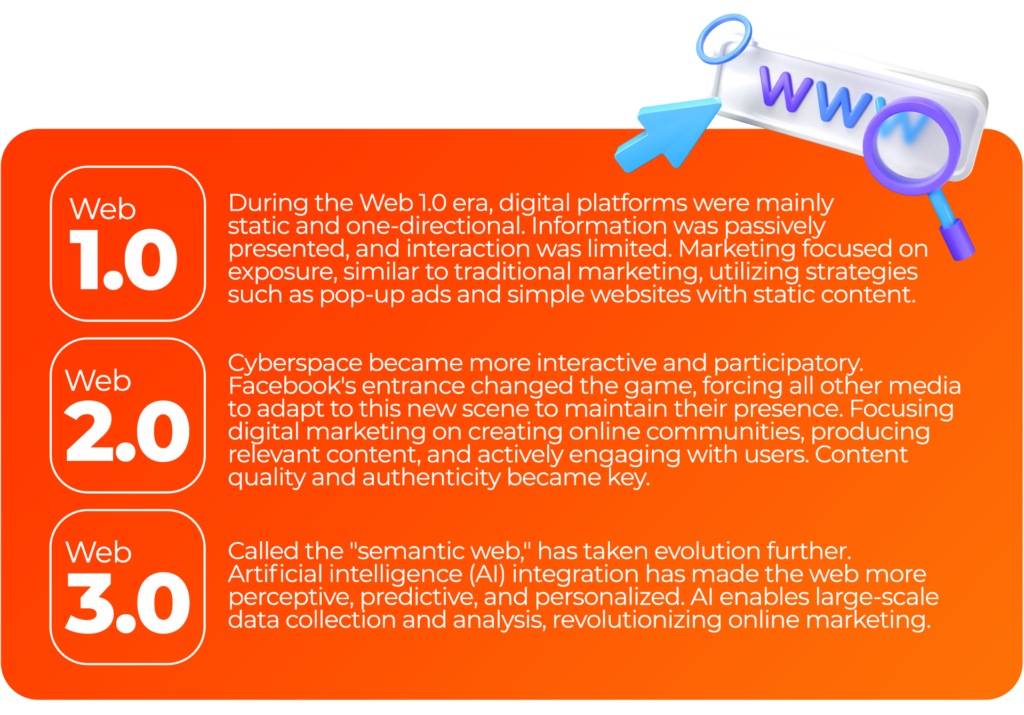
Web 1.0: The Static Web
During the Web 1.0 era, digital platforms were mainly static and one-directional. Information was passively presented, and interaction was limited. Marketing focused on exposure, similar to traditional marketing, utilizing strategies such as pop-up ads and simple websites with static content, lacking user communication and engagement possibilities.
By 2010, amidst queries about the essence of marketing, I shared my understanding of digital marketing as the application of marketing strategies in digital mediums, suggesting that offline techniques were being adapted and translated into a new world.
Digital Marketing is the application of marketing strategies carried out in digital media. All the techniques from the offline world are imitated and translated into a new world.
Claudio Heilborn, MD Marketing Digital CEO & Co-founder
Web 2.0: The Rise of Interaction
With the arrival of Web 2.0, cyberspace became more interactive and participatory. Facebook’s entrance changed the game, forcing all other media to adapt to this new scene to maintain their presence. Previously, creating a business profile to increase a brand’s online visibility was unimaginable. Social media, blogs, and content platforms fostered a two-way dialogue between companies and their audience, focusing digital marketing on creating online communities, producing relevant content, and actively engaging with users. Content quality and authenticity became key.
Web 3.0: The Artificial Intelligence Revolution
Web 3.0, often called the “semantic web,” has taken evolution further. Artificial intelligence (AI) integration has made the web more perceptive, predictive, and personalized. AI enables large-scale data collection and analysis, revolutionizing online marketing. Today, the rapid emergence of AI accessible to the mass public marks a new phase in Digital Marketing, where digital media and tools have evolved significantly, leading to qualitative and quantitative leaps in marketing strategies, collectively known as modern digital marketing.
Importance of Digital Marketing
In today’s fast-paced business landscape, digital marketing has become an essential tool for companies looking to connect with their target audiences effectively. It brings distinct advantages over traditional marketing, offering benefits that are both strategic and practical. Below, we explore why digital marketing holds a prominent place in modern business:
- Cost-Effectiveness: Digital marketing allows businesses of all sizes to optimize their budgets. Compared to traditional advertising, digital marketing channels—such as social media, email, and content marketing—provide cost-effective solutions that yield high returns. This democratization of advertising levels the playing field, enabling small businesses to compete with larger enterprises by targeting niche audiences with tailored campaigns.
- Measurable Results: One of digital marketing’s standout benefits is the ability to track and measure results with precision. Tools like Google Analytics and social media insights offer real-time data, enabling businesses to assess the performance of their campaigns and make informed adjustments. This leads to higher returns on investment, as marketers can see which strategies work and pivot accordingly.
- Large Audience Reach: With digital marketing, companies can reach vast audiences across the globe. Unlike traditional methods that often focus on local markets, digital platforms allow for the expansion into new territories and demographics. Additionally, advanced targeting options ensure that each message reaches a specific, relevant audience segment, increasing the likelihood of engagement and conversion.
Digital marketing is not just a complementary tool for businesses today; it’s a necessity. Leveraging these benefits allows companies to stay competitive, adapt to changes quickly, and engage effectively with their audience, all while achieving measurable success.
Types of Digital Marketing
Digital marketing encompasses a wide range of channels, each offering unique ways to reach and engage audiences. Here’s an overview of the most commonly used digital marketing types:
- Social Media Marketing: This approach uses platforms like Facebook, Instagram, Twitter, and LinkedIn to connect with audiences. Social media marketing allows businesses to build brand awareness, engage directly with customers, and create shareable content that amplifies reach.
- Search Engine Optimization (SEO): SEO is the practice of optimizing a website to rank higher on search engine results pages (SERPs), driving organic traffic. Effective SEO strategies focus on keyword optimization, link building, and content quality, making it easier for potential customers to discover the business through search engines.
- Pay-Per-Click (PPC) Advertising: PPC is a model of online advertising where businesses pay each time a user clicks on their ad. Platforms like Google Ads enable companies to target specific keywords, ensuring their ads reach users actively searching for related products or services.
- Email Marketing: Email remains one of the most effective forms of digital marketing, allowing businesses to communicate directly with subscribers. From product promotions to newsletters, email marketing helps nurture leads, build loyalty, and drive conversions by delivering tailored content to interested recipients.
- Content Marketing: This strategy involves creating and distributing valuable, relevant content to attract and engage a defined audience. Content marketing spans various formats, including blog posts, videos, infographics, and e-books, with the goal of building trust and establishing the business as an industry authority.
Each digital marketing type serves a distinct purpose, and businesses often use a mix of these channels to create a cohesive strategy that maximizes reach and impact.
Web Evolution and its Impact on Digital Marketing
The evolution of the web has deeply impacted digital marketing, shifting focus towards reaching the right audience with precise messages at the ideal time. Artificial Intelligence (AI) has facilitated the creation of smart chatbots, dynamic content personalization based on user behavior, and real-time ad optimization.
Businesses can now deliver highly personalized experiences and advanced audience segmentation thanks to process automation enhancing campaign management efficiency. This evolution has led to a significant increase in digital advertising investment since 2021, as an eMarketer study indicates.
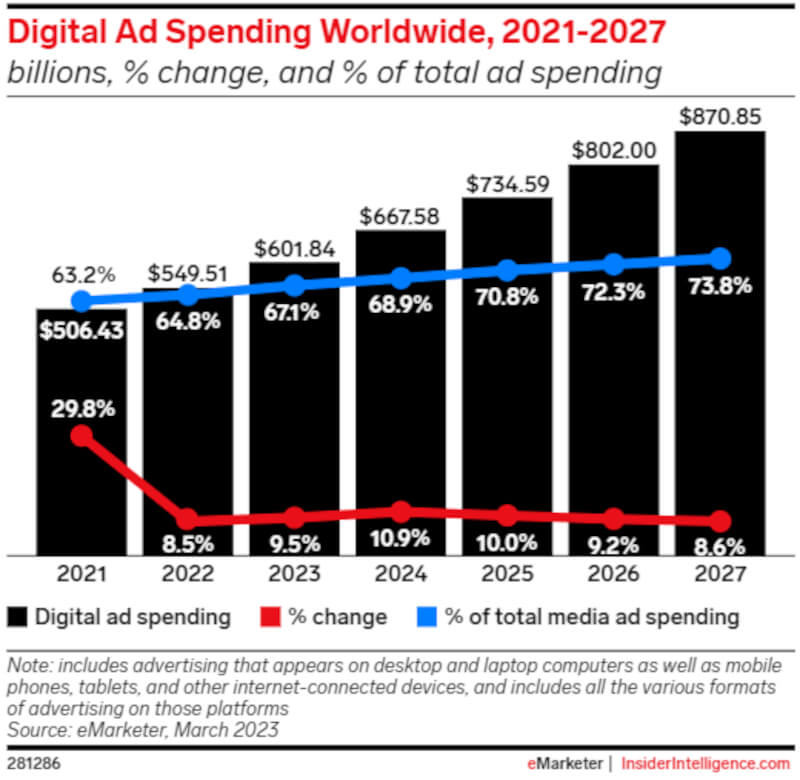
It has been demonstrated that the web has evolved from static to interactive and, finally, to intelligent. This transformation has necessitated and compelled digital marketing to continually change and reinvent itself to meet the expectations and needs of online consumers. We are in an exciting era where technology drives innovation in online marketing.
Marketing techniques must shift their focus to the user, valuing genuine opinions from real product users over sellers’ claims. Consumers can now use search engines to research products and base their decisions on reviews, comments, and ratings from other users.
In this way, potential consumers can search for what they want thanks to the power of search engines (Google, Yahoo, Bing, etc.), and not only ask if their decision is correct but also have the opportunity to read reviews, comments, and ratings from other users, thus developing their own viewpoint, based on their experiences and knowledge.
A study in 2016, during the peak of Web 2.0, found that reviews and comments significantly influence purchasing decisions. Another study in 2023 showed that 55% of respondents considered search engines their primary information source before purchasing, and 31% based their decisions on social media.
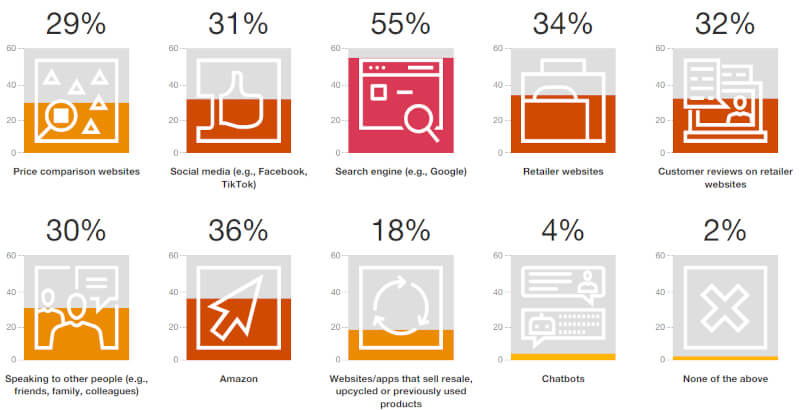
Due to this significant paradigm shift, Google increasingly values such content and promotes the display of comments in forums in search results. Therefore, a digital strategy should encompass all relevant spaces where the target audience interacts, aiming to influence opinions and commentators, improve search engine results, and analyze the information these mediums provide to optimize the performance of the actions taken.
With all this in mind, at MD Marketing Digital, we understand that online marketing is not just a combination of design, creativity, profitability, and analysis that always seeks an ROI. It is an exciting journey that has evolved along with the web itself, from the static days of Web 1.0 to the artificial intelligence of Web 3.0.
Our online marketing agency has witnessed the transition from traditional marketing to digital marketing in a connected and highly personalized world, and we are committed to helping you navigate this new digital landscape to achieve your business goals.
How do you do digital marketing?
In this fast-paced modern world, where the lines between physical and digital constantly blur, online marketing emerges as the shining knight of successful business strategies. It’s no longer enough to advertise in a newspaper or parade around the city in a van with ears and fur to promote your dog grooming business.
To reach your target audience, it’s crucial to think like your potential customers and be where they are in the vast world of online content. The first major secret to digital marketing is knowing your audience intimately. Understanding who they are, what they like, what concerns them, and where they spend their time online is critical.
Listening and understanding your target audience is likened to discovering a treasure map: it leads you directly to your potential customers.
Eugenia Villegas, SEO Specialist in MD Marketing Digital
The next step is creating valuable content, as content takes center stage in the theater of digital marketing. As we move towards Web 3.0, creating valuable and authentic content is crucial. It’s no longer just about selling but also about educating, entertaining, and solving problems. Blogs, videos, infographics, and podcasts are your magical tools. The more relevant and captivating your content, the closer you’ll be to converting viewers into loyal followers.
However, to create valuable content, it will be necessary to understand how your audience communicates. For this, having a solid SEO strategy will be indispensable. Search Engine Optimization (SEO) is the magic that will help you stand out in the digital jungle.
According to a survey conducted in 2023, half of digital marketing specialists stated that Search Engine Optimization (SEO) provided significant benefits to their organizations in 2022. With over 80% of respondents reporting an overall positive impact, it’s clear that this practice is key in the current landscape.
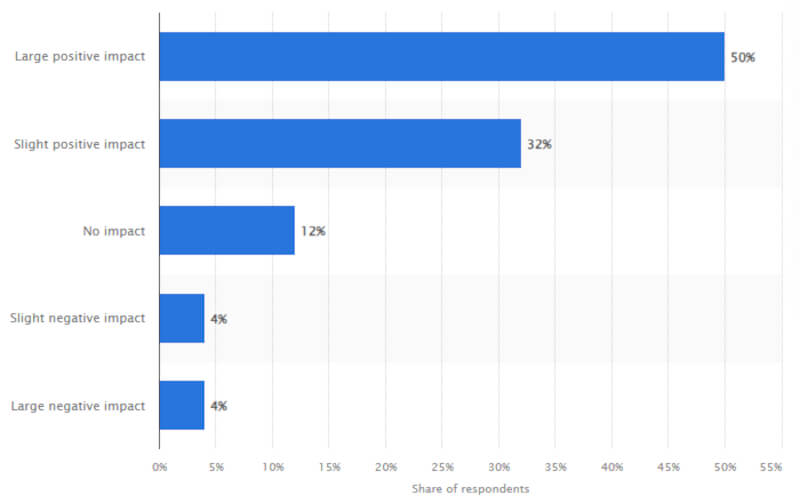
This study demonstrates the importance of having an SEO agency to research the keywords your audience uses to search for information and ensure that your content is properly optimized for them. This approach will improve your visibility on search engines like Google, making your content discovery easier.
However, it’s more than just knowing the right keywords. It’s also essential to manage your presence on social media strategically. If people are going to talk about you, make sure they do so in an environment controlled by your brand. Social media platforms are the pulse of online conversation, and actively participating allows you to shape your brand’s perception.
Speaking about the importance of online presence, the fundamental role your website plays in the realm of digital marketing stands out. More than just a digital storefront, your website constitutes the heart of your online presence, serving as a platform where you showcase your products or services. It is essential to provide a unique user experience and authentically communicate the value of your business model. From web design to navigation structure, every detail becomes crucial to ensure visitors find what they need and transform into satisfied customers, highlighting the proper management of a web design company.
Moreover, the art of how to do digital marketing is incomplete without the ability for meticulous analysis. Each implemented strategy must have a clear purpose, and the only way to determine its effectiveness is through evaluating concrete results. Therefore, employing data analysis tools that allow you to measure the performance of your strategies is essential. What aspects are functioning effectively and which are not? From these findings, the door to continuous learning opens, enabling you to continuously adjust and refine your campaigns.
What’s new in digital marketing?
- Measurable results: This is the main and most evident advantage of digital marketing. Thanks to multiple analytical tools, it allows for more precise tracking of Return on Investment (ROI) than traditional marketing.
- Global reach: When we talk about global reach, we mean that, with the internet, we can reach people from anywhere in the world.
- Immediacy: Digital media allow us to see the results of a campaign in real time, so we can adjust and optimize it as necessary.
- Customer loyalty: Social media allows us to build stronger bonds with our customers and create a broader online community than we could offline.
- Precision in targeting: While a traditional marketing ad is printed to a large undifferentiated audience, in digital marketing, we can direct ads to a specific audience, thus achieving much more efficient campaigns.
Conclusion
Revisiting what we said earlier, in this liquid world, learning never ends. And digital marketing is not exempt from changes; this discipline is much more than a commercial strategy: it is an art in constant evolution. By embracing the evolution of the web, from the static 1.0 to the artificial intelligence of Web 3.0, we have witnessed how marketing has adapted to a constantly changing digital environment.
This journey has revealed to us that online marketing is an ever-evolving process where successful strategies of yesterday can quickly become obsolete. The key to success lies in adapting and learning from our successes and failures.
In this fascinating environment, where creativity, understanding of the audience, and flexibility are the tools of the contemporary magician of digital marketing, let’s remember that we are exploring seas in constant transformation. Let’s use technology and interconnectedness to design valuable experiences and establish meaningful connections with our audience.And let’s never forget what truly matters: digital marketing is an exciting journey in which the only constant is change; only those who can adapt and evolve are destined to succeed.
- What is Digital Marketing? - February 28, 2024
- Fake news and digital ethics: our commitment to truth in the era of misinformation on social media. - February 28, 2024
- Authority in the Age of AI Generated Content - May 24, 2023
¿Qué te pareció este artículo?
What do you think about this post?

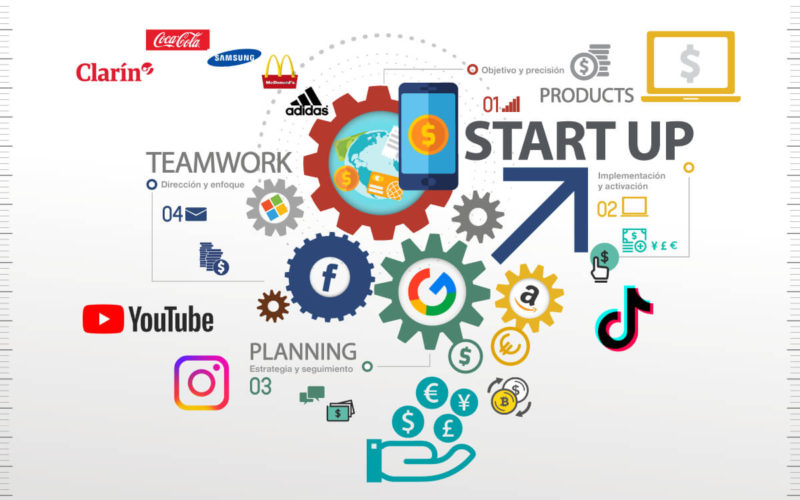



Very informative article about digital marketing . Great information on digital marketing. Thank you and keep blogging.
Hi Ravi, thank you for your kind words! We’re glad you found the article informative. At MD Marketing Digital, we strive to share valuable insights on digital marketing to help businesses grow. Stay tuned for more content!
Excellent blog! Clear and concise explanation of digital marketing basics. Perfect for beginners and professionals alike. Keep sharing such valuable content!
Excellent overview of digital marketing! The breakdown of channels and strategies is very clear. How would you prioritize these for a startup with a tight budget?”
Thank you for your thoughtful feedback, Suraj! We’re glad you found our overview of Digital Marketing helpful and clear. For a startup with a tight budget, we’d recommend prioritizing channels like social media marketing and email marketing, as they often offer the best ROI with lower costs. At MD Marketing Digital, we’re here to help if you need more tailored advice. Best of luck with your startup!
Informative and well-written! I appreciate the effort put into creating this content.
Thank you so much for your kind words, Aftab! We’re delighted that you found our blog on Digital Marketing informative and well-written. At MD Marketing Digital, we strive to create content that adds value for our readers. Stay tuned for more!
“To truly connect with your audience, step into their shoes—understand their needs, and your message will resonate effortlessly.”
Thank you for sharing such an insightful perspective, Deepanshu! Truly understanding your audience is the cornerstone of effective Digital Marketing. At MD Marketing Digital, we’re passionate about helping businesses connect authentically with their audiences. Keep embracing that approach—it’s the key to success!
Great article! The explanation of digital marketing is clear and concise, making it accessible for readers at any level of expertise.
Thank you for your kind words, Suraj! We’re thrilled to know that our explanation of Digital Marketing was clear and accessible for all readers. At MD Marketing Digital, we’re committed to creating content that helps everyone, regardless of their expertise. Stay tuned for more insights!
Your blog is comprehensive about digital marketing and its need for growth in any kind of business. Thank you.
Thank you for your thoughtful feedback! We’re delighted that you found our blog on Digital Marketing comprehensive and valuable for business growth. At MD Marketing Digital, our goal is to provide insights that truly make a difference. Stay tuned for more helpful content!
Thank you for sharing this insightful Blog. The tips provided are practical and easy to implement.
Thank you so much for your kind words, Ruchi! We’re thrilled to hear that you found the tips in our Digital Marketing blog practical and easy to implement. At MD Marketing Digital, we’re committed to sharing actionable insights to help you succeed. Stay tuned for more content!
i have read your entire blog. It’s a great article
Thank you so much for reading the entire blog, Nitesh! I’m glad you enjoyed the article. Your feedback means a lot to us. If you have any questions or suggestions for future topics, feel free to share. Thanks again!
Digital marketing refers to the use of digital channels, such as websites, social media, email, and search engines, to reach and engage with customers. It includes strategies like SEO, content marketing, online ads, and email campaigns to promote products or services. This approach is data-driven and allows for targeted, measurable results that help businesses grow and adapt to market demands.
Thank you for your detailed comment, Aravind! You’ve captured the essence of Digital Marketing perfectly. At MD Marketing Digital, we’re passionate about sharing insights on strategies like SEO, content marketing, and more to help businesses thrive in the digital space. We appreciate your engagement—keep exploring and growing!
Great information on digital marketing. Thank you and keep blogging.
Thank you for your kind feedback, Ahamed! We’re glad you found the information on Digital Marketing valuable. At MD Marketing Digital, we’ll keep sharing insights to help our readers stay informed. Stay tuned for more blogs!
Thanks for sharing this. It was very informative.
Thank you for your kind words, Kushi! We’re thrilled to hear that you found our blog on Digital Marketing informative. At MD Marketing Digital, we’re committed to sharing valuable insights to help our readers stay informed. Stay tuned for more!